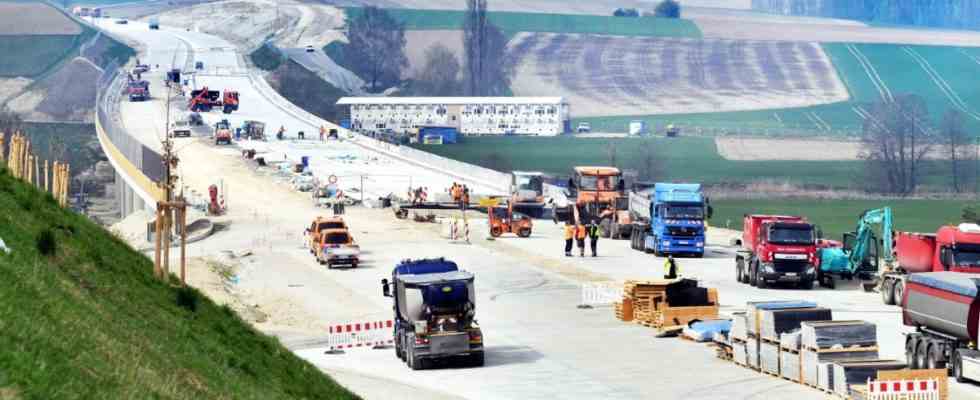It wasn’t that long ago that Olaf Scholz, the self-proclaimed climate chancellor, saluted from the election posters. “Chancellor for climate protection,” it said, along with the promise: “Scholz will tackle it.” He visited wind farms and had cement factories explain to him how the conversion towards climate-neutral management should work. During the election campaign, the Social Democrats sometimes seemed greener than green.
And now? When the heads of the coalition meet for the summit next Sunday, there will be a number of unresolved issues on the pile that are directly or indirectly related to the Chancellor’s favorite topic of the past. The alliance is arguing about climate protection in traffic, about the future of fossil fuel heating, about the accelerated expansion of motorways. But whose side the SPD is on is one of the big puzzles before the meeting. And there is much to suggest that it is now closer to the FDP than the Greens when it comes to environmental issues.
For example, in the dispute over the accelerated freeway expansion demanded by the FDP. “The Federal Roads Plan applies. We also need projects to close gaps and prevent new bottlenecks,” said Rolf Mützenich, chairman of the parliamentary group, in an interview with the Süddeutsche Zeitung.
climate crisis? Rolf Mützenich prefers to speak of “politics of objectivity and reason”
But while the Greens want to expand all possible infrastructures more quickly, but not new autobahns, Mützenich speaks of a “politics of objectivity and reason”. After all, care was taken in the grand coalition to avoid climate damage while at the same time ensuring “that everyone can participate in structural change and is not overwhelmed”. When replacing old gas and oil heating systems, for example, it is important to ensure that it is accompanied by a support program for low-income households.
The SPD parliamentary group had become significantly younger after the Bundestag elections, with 49 deputies under and up to the age of 35. But anyone who believes that the Fridays-for-future generation is now demanding unconditional climate protection is mistaken. “I can see with the young MPs in particular that they have a strong focus on social issues in climate and environmental policy, and also what it means for industry,” says Mützenich.
In any case, many of the newcomers have become members of the party’s conservative current, the Seeheimer Kreis, and not of the Parliamentary Left, which used to be an almost unwritten law in the Juso camp. Above all, the Seeheimers have the industry in mind during the whole structural change. One of the newcomers to the Seeheim team is Isabel Cademartori. The member of parliament from Mannheim fights for biofuel, as it is produced on German fields – and thus against the plans of the Green Environment Minister Steffi Lemke. “The SPD should be the party of technology and climate protection,” she says. “When in doubt, we should prefer that – and I believe that the majority sees it that way.” This view prevails, especially among younger MPs. “It may be that we are sometimes closer to the FDP than to the Greens,” she says. “But overemphasizing nature conservation doesn’t help us with climate protection.”
Environmental groups bring the new red pragmatism to despair. “Olaf Scholz may be a friend of renewable energies – but nature conservation or biodiversity are alien to him,” says BUND boss Olaf Bandt. “That doesn’t make it any easier for environmental organizations to deal with the SPD.” On top of that, there are also demands in the SPD to speed up “somehow everything”, also at the expense of nature conservation and environmental impact assessments. “This is a serious problem.” However, because the party tends to act as a moderator in many coalition debates, its actual position often only becomes clear at a late stage.
“The FDP and the Greens, who are at odds with each other, are the most prominent in the public eye.”
In fact, the Social Democrats have found a comfortable position – in limbo above the other two coalition partners. “The FDP and the Greens, who are at odds with each other, are the main public figures,” says the parliamentary group’s top environmental politician, its deputy leader Matthias Miersch. “We don’t argue publicly, but set our accents in confidential discourse.” On top of that, the SPD needs it as the social conscience of the coalition. “The Greens sometimes take an overly one-dimensional approach,” Miersch complains.
The chairman of the transport committee, Udo Schiefner (SPD), warns that there are too many sham debates – he criticizes the FDP and the Greens. “Disputes about fuel that isn’t available at all, or about the construction of a new freeway, which nobody is planning, may be important for the clientele in question. That stands in the way of our common good.” He sees the SPD in a constant mediating role. “I’d rather solve problems.” For example, the rapid expansion of the charging infrastructure, especially for trucks in freight transport on the road. He wonders who actually wants to achieve more for the climate goals in this decade, Schiefner teases the Greens. “The salvation of all of our souls” does not lie solely on the rails.
But there are also signs in the SPD that there is a risk of conflict on some issues. Already in the discussion about biofuels, there are definitely different views among the Social Democrats. And then there are issues that some young MPs are much more open to than old environmentalists, such as the underground storage of carbon dioxide or new breeding methods in genetic engineering. “Of course there are always questions where there is a need for discussion in the parliamentary group,” says Matthias Miersch. It is normal for discussions to take place in a parliamentary group. But the SPD believes that it is better to argue internally than on the public stage.

